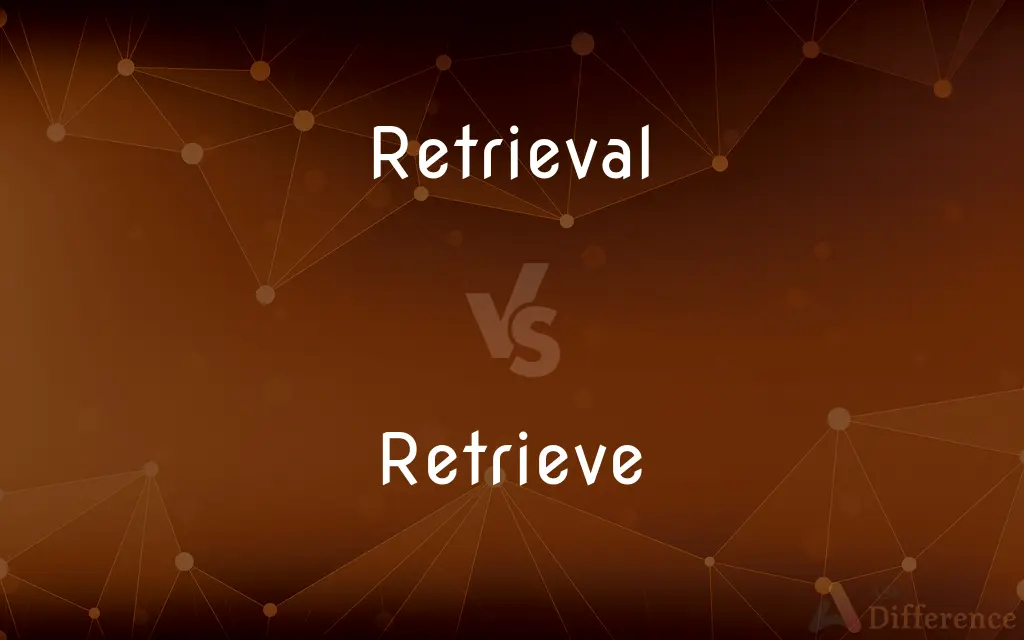Retrieval vs. Retrieve — What's the Difference?
By Tayyaba Rehman & Maham Liaqat — Updated on March 11, 2024
Retrieval focuses on the process of getting information or data back, while retrieve is the action of obtaining something that was lost or stored.

Difference Between Retrieval and Retrieve
Table of Contents
ADVERTISEMENT
Key Differences
Retrieval refers to the overall process or system involved in obtaining information or data from where it has been stored. This can involve complex systems or procedures, especially in the context of data storage, where retrieval might include searching, locating, and delivering data to the user. Whereas, retrieve is a verb that describes the act of getting something back, often something that has been lost, stored, or needs to be recalled. This action can apply to physical objects as well as data or information.
In the context of computer science, retrieval often implies a systematic approach to finding and accessing data within databases or other storage structures. This process can be sophisticated, involving algorithms and search mechanisms to efficiently locate specific information. On the other hand, to retrieve data or an object simply means to bring it back or to recover it, without necessarily implying a complex process.
When discussing memory, retrieval refers to the cognitive process of recalling information stored in the brain. This involves accessing memories or information from one's past experiences. Meanwhile, to retrieve a memory would mean to actively recall or bring that specific memory to consciousness.
In libraries and information science, retrieval is associated with retrieving information from a vast amount of resources. This includes the methodology and tools used to find and access information within books, databases, or archives. Retrieve, in this context, might refer to the specific action of finding and obtaining a book or document from its physical or digital location.
The term retrieval is also used in contexts like search and rescue operations, emphasizing the system and strategy behind locating and saving people or objects. Retrieve, in similar situations, focuses on the action of saving or recovering the person or item in question.
ADVERTISEMENT
Comparison Chart
Definition
The process or system of getting information or data back.
The act of getting something back that was lost or stored.
Context
Often used in technical, scientific, and information systems.
Broadly used in various contexts including everyday language.
Focus
Emphasizes the system or process.
Focuses on the action.
Complexity
May imply a complex or systematic approach.
Can be simple or complex, but often seen as a direct action.
Examples
Data retrieval in databases, memory retrieval in psychology.
Retrieve a lost item, retrieve data from a computer.
Compare with Definitions
Retrieval
In computing, the action of accessing data stored in memory or a storage device.
The software improves the retrieval of files from damaged hard drives.
Retrieve
In computing, to recover data or files from a storage medium.
The program can retrieve deleted files from the recycle bin.
Retrieval
The operation in search and rescue missions aimed at locating and saving people or objects.
The retrieval operation for the missing hikers lasted two days.
Retrieve
In hunting, dogs are trained to retrieve game.
The retriever was quick to fetch the downed bird.
Retrieval
The process of getting information or data back from storage or memory.
Efficient data retrieval systems are essential for quick access to information.
Retrieve
To go back and get something left behind.
I have to retrieve my umbrella from the restaurant.
Retrieval
In psychology, the act of recalling past memories or experiences.
Memory retrieval can sometimes be triggered by specific smells or sounds.
Retrieve
To bring back information or recall a memory.
He struggled to retrieve the name of his fifth-grade teacher.
Retrieval
The method of finding and accessing specific information within large databases.
The library's database facilitates the retrieval of articles and books on numerous subjects.
Retrieve
To get something back that was lost or stored away.
She managed to retrieve her lost keys from the lost and found.
Retrieval
The process of getting something back from somewhere
The investigation was completed after the retrieval of plane wreckage
Retrieve
Get or bring (something) back from somewhere
Steven stooped and retrieved his hat
I was sent to retrieve the balls from his garden
Retrieval
The action of obtaining or consulting material stored in a computer system
Online information retrieval
Storage and retrieval systems
Retrieve
Find or extract (information stored in a computer)
Other features include the ability to store, update, retrieve, and print your data
Retrieval
The act or process of retrieving.
Retrieve
Put right or improve (an unwelcome situation)
He made one last desperate attempt to retrieve the situation
Retrieval
(Computers) The process of accessing information from memory or other storage devices.
Retrieve
An act of retrieving something, especially game that has been shot
Watch the dog make the long retrieves
Retrieval
The possibility of being retrieved or restored
Lost possessions beyond retrieval.
Retrieve
The possibility of recovery
He ruined himself beyond retrieve
Retrieval
The act of retrieving or something retrieved
Retrieve
To get back into one's grasp, possession, or control, especially from a known place or a place of storage
Retrieved his coat from the closet.
Retrieval
(computing) the operation of accessing data, either from memory or from a storage device
Retrieve
To go to and bring or escort back (someone)
Retrieved his friend from the bus station.
Retrieval
The cognitive process of bringing stored information into consciousness
Retrieve
To search for, find, and bring back
Divers retrieving artifacts from a shipwreck.
Retrieval
The act retrieving.
Retrieve
To search for, find, and carry back (killed game or a thrown object). Used of dogs.
Retrieval
(computer science) the operation of accessing information from the computer's memory
Retrieve
To gain access to (stored information).
Retrieval
The cognitive operation of accessing information in memory;
My retrieval of people's names is very poor
Retrieve
To recall to mind (a memory, for example); remember.
Retrieval
The act of regaining or saving something lost (or in danger of becoming lost)
Retrieve
To rescue or save
Tried to retrieve him from the degradation of life as a runaway.
Retrieve
(Sports) To make a difficult but successful return of (a ball or shuttlecock, as in tennis or badminton).
Retrieve
To restore to a former or desirable condition
Did whatever he could to retrieve his honor.
Retrieve
To rectify the unfavorable consequences of; remedy
"An attempt was made to retrieve the blunder" (Francis Parkman).
Retrieve
To find and bring back game or a thrown object
A dog trained to retrieve.
Retrieve
The act of retrieving; retrieval.
Retrieve
(Sports) A difficult but successful return of a ball or shuttlecock.
Retrieve
(transitive) To regain or get back something.
To retrieve one's character or independence; to retrieve a thrown ball
Retrieve
(transitive) To rescue (a creature).
Retrieve
(transitive) To salvage something
Retrieve
(transitive) To remedy or rectify something.
Retrieve
(transitive) To remember or recall something.
Retrieve
(transitive) To fetch or carry back something, especially (computing) a file or data record.
Retrieve
(transitive) To fetch and bring in game.
The cook doesn't care what's shot, only what's actually retrieved.
Retrieve
(intransitive) To fetch and bring in game systematically.
Dog breeds called 'retrievers' were selected for retrieving.
Retrieve
(intransitive) To fetch or carry back systematically, notably as a game.
Most dogs love retrieving, regardless of what object is thrown.
Retrieve
To make a difficult but successful return of the ball.
Retrieve
(obsolete) To remedy the evil consequence of, to repair (a loss or damage).
Retrieve
A retrieval
Retrieve
(sports) The return of a difficult ball
Retrieve
(obsolete) A seeking again; a discovery.
Retrieve
(obsolete) The recovery of game once sprung.
Retrieve
To find again; to recover; to regain; to restore from loss or injury; as, to retrieve one's character; to retrieve independence.
With late repentance now they would retrieveThe bodies they forsook, and wish to live.
Retrieve
To recall; to bring back.
To retrieve them from their cold, trivial conceits.
Retrieve
To remedy the evil consequence of, to repair, as a loss or damadge.
Accept my sorrow, and retrieve my fall.
There is much to be done . . . and much to be retrieved.
Retrieve
To discover and bring in game that has been killed or wounded; as, a dog naturally inclined to retrieve.
Retrieve
A seeking again; a discovery.
Retrieve
The recovery of game once sprung; - an old sporting term.
Retrieve
Get or find back; recover the use of;
She regained control of herself
She found her voice and replied quickly
Retrieve
Of trained dogs
Retrieve
Recall knowledge from memory; have a recollection;
I can't remember saying any such thing
I can't think what her last name was
Can you remember her phone number?
Do you remember that he once loved you?
Call up memories
Common Curiosities
How is retrieval used in the context of search engines?
In search engines, retrieval involves the algorithms and processes that search, index, and rank web pages to present relevant results to users, based on their queries.
How does memory retrieval work?
Memory retrieval is the cognitive process of recalling information stored in the brain, which can be influenced by various factors including cues or context.
Can objects be retrieved, or does retrieve only apply to data and information?
Retrieve can apply to both physical objects and data/information. It encompasses any action where an item is gotten back, regardless of its nature.
What does retrieval mean in computing?
In computing, retrieval refers to the process of accessing and bringing back data or information from storage or a database.
How do retrieval and retrieve differ in context?
Retrieval often refers to the system or process in various contexts, whereas retrieve focuses on the specific action of getting something back.
Is retrieval always related to complex systems?
While retrieval can involve complex systems, especially in computing or information science, it broadly refers to any process of getting information back.
What is the significance of retrieval in memory psychology?
In memory psychology, retrieval is crucial as it involves accessing and bringing to consciousness the stored memories, playing a key role in how we recall past experiences and information.
Can retrieve be used in a digital context?
Yes, retrieve is commonly used in digital contexts to describe the action of recovering data or files from a storage medium.
What roles do retrieval and retrieve play in data management?
In data management, retrieval refers to the overarching processes and systems designed for accessing data, while retrieve denotes the specific action of obtaining the necessary data from these systems.
How do retrieval systems enhance user experience in digital platforms?
Retrieval systems enhance user experience by efficiently locating and presenting the desired information or data, reducing search time and improving accessibility, which is essential for user satisfaction in digital platforms.
Share Your Discovery

Previous Comparison
Factious vs. Fractious
Next Comparison
Rent vs. LetAuthor Spotlight
Written by
Tayyaba RehmanTayyaba Rehman is a distinguished writer, currently serving as a primary contributor to askdifference.com. As a researcher in semantics and etymology, Tayyaba's passion for the complexity of languages and their distinctions has found a perfect home on the platform. Tayyaba delves into the intricacies of language, distinguishing between commonly confused words and phrases, thereby providing clarity for readers worldwide.
Co-written by
Maham Liaqat













































